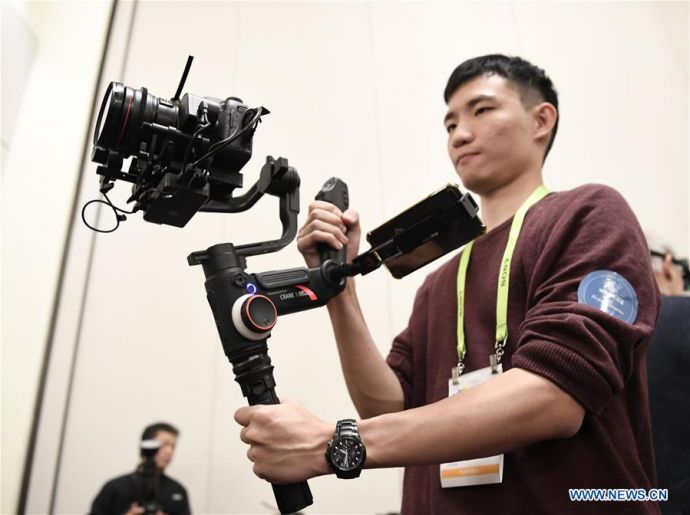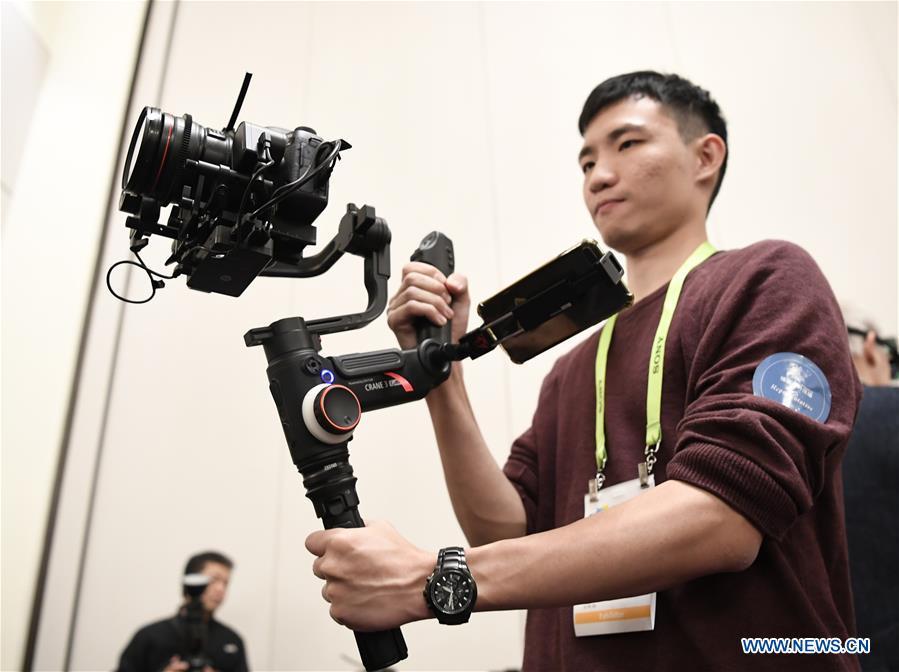
A new handheld gimbal is seen during a press preview held by members of the Chinese corps attending the 2019 Consumer Electronics Show (CES) in Las Vegas, the United States, Jan. 7, 2019. The 2019 Consumer Electronics Show (CES) opens on Tuesday. (Xinhua/Liu Jie)
LAS VEGAS, the United States, Jan. 8 (Xinhua) -- About 1,200 Chinese tech companies, including industry giants like JD.com and Huawei as well as startups, put their innovations in AI and robotics on display at the annual Consumer Electronics Show (CES), which kicked off Tuesday in Las Vegas.
The Chinese companies tried to expand their international market presence with their home-grown gadgets, although the number of exhibitors dropped about 20 percent as China and the United States are negotiating to ease their trade tensions.
The number of Chinese companies reached a record high in CES 2018 of more than 1,500. The shrinkage of Chinese participation amid a trade strain cast a shadow on American tech sector.
Gary Shapiro, president of the U.S. Consumer Technology Association, the show's organizer, told Xinhua that tariffs on Chinese products are actually costing the U.S. tech industry and American consumers about a billion dollars a month.
Shapiro said he was concerned about America's export control proposal on emerging technologies like artificial intelligence (AI). He listed AI, along with 5G, self-driving tech and digital health, as trend to watch in CES 2019 at Monday's presentation.
But the export control will restrict the advancement of AI, especially in the United States, said Shapiro.
Chinese made products can still be found easily in almost every category like HD TV, robotics and smart retailing, occupying about 14 percent of the net exhibiting space. Many Chinese tech companies, especially the most innovative ones, are still looking to the long-term prospects in American market.
A Chinese company specializing in voice recognition, iFLYTEK, is one of them. Rivaling Google and Amazon, the AI tech-driven company unveiled its fully upgraded smart translator, an honoree of CES 2019 Innovation Award at CES.
Charlene Li, general manager of iFLYTEK North America, told Xinhua that expansion in the American market may be an uphill journey in the short term, but "if we wouldn't plan ahead and do spade work, we had to do it several years later, which is too late."
Alpha Mini robot developed by UBITECH, and Mabot developed by Shenzhen Bell, both Chinese startups, are also listed as CES's annual Innovation Awards.
Shapiro said Chinese companies came to CES with multiple intentions. They either meet sellers or buyers, or build their brand, or form partnership.
China's second largest online retailer JD.com made a debut at CES this year, showcasing at the exhibition booth an unmanned delivery vehicle in dense urban areas and a drone used in a delivery network for rural shipments.
Zhang Chen, JD.com's CTO, will share his understanding of the Asian retail market in a seminar on Wednesday to help American companies to make a faster presence in Chinese market.
Huawei released its two new products at CES: a high-end laptop and a smart watch. Both will be put on shelves in the United States this month but Huawei's smartphones are almost locked out of the American market.
"If you are trading with the countries you are more likely to have a good relationship with them," said Shapiro, calling for a more "normalized" trade relationship between the two countries.
CES, the world's largest trade show to present new products and technologies in the consumer electronics industry, runs till Friday, attracting about 4,500 exhibitors and 180,000 attendees in 2019.




 A single purchase
A single purchase









